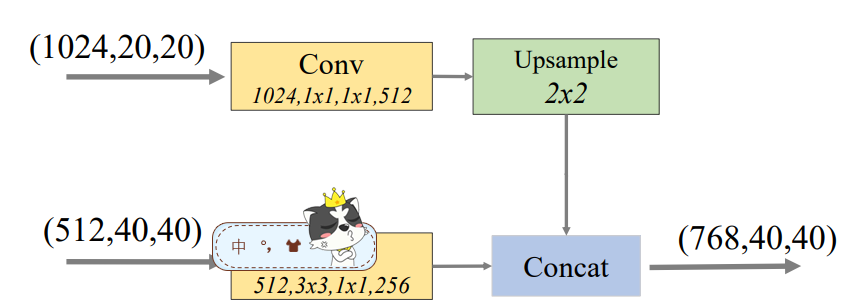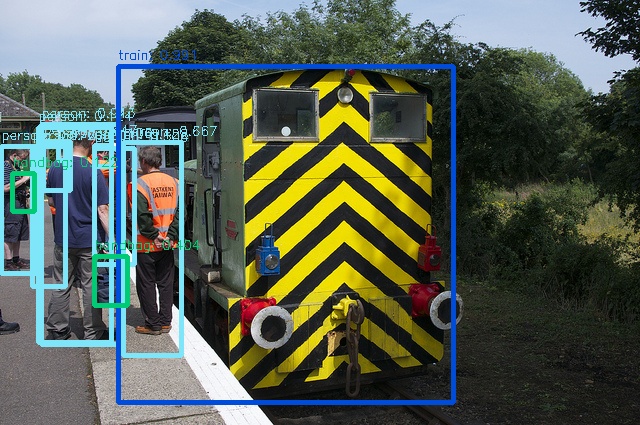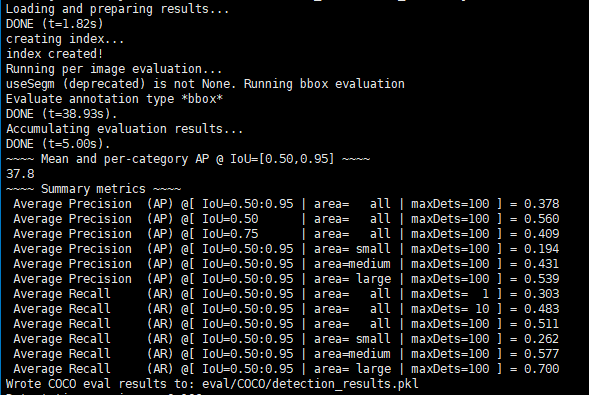Codebase for AAAI2019 "M2Det: A Single-Shot Object Detector based on Multi-Level Feature Pyramid Network" [Paper link]
Author: Qijie Zhao. Date: 19/01/2019

Beyond scale variation, appearance-complexity variation should be considered too for the object detection task, due to that the object instances with similar size can be quite different.

To solve this, we extend multi-scale detection fashions with a new dimension: multi-level. Deeper level learns features for objects with more appearance-complexity variation(e.g., pedestrian), while shallower level learns features for more simplistic objects(e.g., traffic light).
1, We propose Multi Level FPN:

2, Based on MLFPN, we propose a single-shot object detector: M2Det, which represents the Multi-Level Multi-Scale Detector.

We use the output of FFMv1(Feature Fusion Module v1) to construct the base feature. The size is fixed as (c=768, w=W/8, h=H/8), in which (W,H) denote the image's input size. While the input feature of FFMv1 is a shallower feature(the size is (W/4, H/4),to keep more details) and a deeper feature(the size is (W/8,H/8),to represent more semantics). For VGG16-reduced backbone, they are conv4-3 and conv6-2(maybe the names are different). While for ResNet series, we first set the striding of Res4 from 2 to 1, then we choose the output of Res3 and Res5 as the input of FFMv1, of course we can also choose the output of Res4 and Res5.

Given the base feature, we start to form the M2F. For each TUM(Thinned U-shaped Module), we use a leach layer(actually, it's a 1x1 conv layer to extract a thinner feature from the base feature, it's in the FFMv2) to get the feature from base feature, and concat it with the output of the last TUM as the input of TUM. At last, aggregate the pyramidal features from all levels with similar scales.


We get the multi-level multi-scale feature, and try to re-allocate a weight for them to force the feature focusing more on the most useful channels/levels. Depending on the compress ratios, we use a SE attention module for each scale feature to learn attention along channel dimension.

- 13 Nov, 2018 - Release the paper
- 1 Mar, 2019 - Release the training, evaluation, multi-scale evaluation and inference demo code + provide a pretrained model
- 1 Apr, 2019 - Release most of the pretrained models
the supported version is pytorch-0.4.1
- Prepare python environment using Anaconda3.
- Install deeplearning framework, i.e., pytorch, torchvision and other libs.
conda install pytorch==0.4.1 torchvision -c pytorch
pip install opencv-python tqdm- Clone this repository.
git clone https://github.com/qijiezhao/M2Det.git- Compile the nms and coco tools:
sh make.sh- Prepare dataset (e.g., VOC, COCO), refer to sss.pytorch for detailed instructions.
We provide a M2Det512_vgg pretrained model for demonstration(visualization):
First, download the pretrained m2det512_vgg.pth(baidu cloud,google drive) file. Then, move the file to weights/.
python demo.py -c=configs/m2det512_vgg.py -m=weights/m2det512_vgg.pth --showYou can see the image with drawed boxes as:

You can also run real-time demo using your webcam by specifying the camera's device ID with option --cam.
python demo.py -c=configs/m2det512_vgg.py -m=weights/m2det512_vgg.pth --show --cam=0In addition, I really suggest you to change the nms type from soft-nms to hard-nms for faster visualization. Soft-NMS is good for mAP accuracy, but it's useless for Demo/Vis.
Thanks for the volunteer demonstration of m2det: entry1, entry2, entry3.
1, We provide evaluation script for M2Det:
python test.py -c=configs/m2det512_vgg.py -m=weights/m2det512_vgg.pthThen, the evaluated result is shown as:

Even higher than our paper's original result! :)
2, You can run the test set with M2Det and submit to get a score:
python test.py -c=configs/m2det512_vgg.py -m=weights/m2det512_vgg.pth --testand submit the result file to CODALAB webpage.
As simple as demo and evaluation, Just use the train script:
CUDA_VISIBLE_DEVICES=0,1,2,3 python train.py -c=configs/m2det512_vgg.py --ngpu 4 -t TrueAll training configs and model configs are written well in configs/*.py.
To be added.
Now, we only provide m2det512_vgg.pth(baidu cloud,google drive) due to we have other tasks recently, we decide to release other models in the future.
Please cite the following paper if you feel M2Det useful to your research
@inproceedings{M2Det2019aaai,
author = {Qijie Zhao and
Tao Sheng and
Yongtao Wang and
Zhi Tang and
Ying Chen and
Ling Cai and
Haibing Lin},
title = {M2Det: A Single-Shot Object Detector based on Multi-Level Feature Pyramid Network},
booktitle = {The Thirty-Third AAAI Conference on Artificial Intelligence,AAAI},
year = {2019},
}
For any question, please file an issue or contact
Qijie Zhao: zhaoqijie@pku.edu.cn